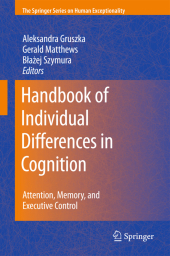 Neuerscheinungen 2012Stand: 2020-01-07 |
Schnellsuche
ISBN/Stichwort/Autor
|
Herderstraße 10
10625 Berlin
Tel.: 030 315 714 16
Fax 030 315 714 14
info@buchspektrum.de |

Aleksandra Gruszka, Gerald Matthews, Blazej Szymura
(Beteiligte)
Handbook of Individual Differences in Cognition
Attention, Memory, and Executive Control
Herausgegeben von Gruszka, Aleksandra; Matthews, Gerald; Szymura, Blazej
2012. 2012. xxiv, 494 S. 32 Tabellen. 254 mm
Verlag/Jahr: SPRINGER, BERLIN 2012
ISBN: 1-461-43217-0 (1461432170)
Neue ISBN: 978-1-461-43217-3 (9781461432173)
Preis und Lieferzeit: Bitte klicken
Presenting a unique approach to the subject of cognition, this volume reaches beyond the standard view of exceptional cognition equaling superior intelligence. It examines the latest findings from psychobiology, cognitive psychology, and neuroscience.
As cognitive models of behavior continue to evolve, the mechanics of cognitive exceptionality, with its range of individual variations in abilities and performance, remains a challenge to psychology. Reaching beyond the standard view of exceptional cognition equaling superior intelligence, the Handbook of Individual Differences in Cognition examines the latest findings from psychobiology, cognitive psychology, and neuroscience, for a comprehensive state-of-the-art volume.
Breaking down cognition in terms of attentional mechanisms, working memory, and higher-order processing, contributors discuss general models of cognition and personality. Chapter authors build on this foundation as they revisit current theory in such areas as processing effort and general arousal and examine emerging methods in individual differences research, including new data on the role of brain plasticity in cognitive function. The possibility of a unified theory of individual differences in cognitive ability and the extent to which these variables may account for real-world competencies are emphasized, and commentary chapters offer suggestions for further research priorities.
Coverage highlights include:
The relationship between cognition and temperamental traits.
The development of autobiographical memory.
Anxiety and attentional control.
The neurophysiology of gender differences in cognitive ability.
Intelligence and cognitive control.
Individual differences in dual task coordination.
The effects of subclinical depression on attention, memory, and reasoning.
Mood as a shaper of information.
Researchers, clinicians, and graduate students in psychology and cognitive sciences, including clinical psychology and neuropsychology, personality and social psychology, neuroscience, and education, will find the Handbook of Individual Differences in Cognition an expert guide to the field as it currently stands and to its agenda for the future. As cognitive models of behavior continue to evolve, the mechanics of cognitive exceptionality, with its range of individual variations in abilities and performance, remains a challenge to psychology. Reaching beyond the standard view of exceptional cognition equaling superior intelligence, the Handbook of Individual Differences in Cognition examines the latest findings from psychobiology, cognitive psychology, and neuroscience, for a comprehensive state-of-the-art volume.
Breaking down cognition in terms of attentional mechanisms, working memory, and higher-order processing, contributors discuss general models of cognition and personality. Chapter authors build on this foundation as they revisit current theory in such areas as processing effort and general arousal and examine emerging methods in individual differences research, including new data on the role of brain plasticity in cognitive function. The possibility of a unified theory of individual differences in cognitive ability and the extent to which these variables may account for real-world competencies are emphasized, and commentary chapters offer suggestions for further research priorities.
Coverage highlights include:
The relationship between cognition and temperamental traits.The development of autobiographical memory.Anxiety and attentional control.The neurophysiology of gender differences in cognitive ability.Intelligence and cognitive control.Individual differences in dual task coordination.The effects of subclinical depression on attention, memory, and reasoning.Mood as a shaper of information.Researchers, clinicians, and graduate students in psychology and cognitive sciences, including clinical psychology and neuropsychology, personality and social psychology, neuroscience, and education, will find the Handbook of Individual Differences in Cognition an expert guide to the field as it currently stands and to its agenda for the future.


